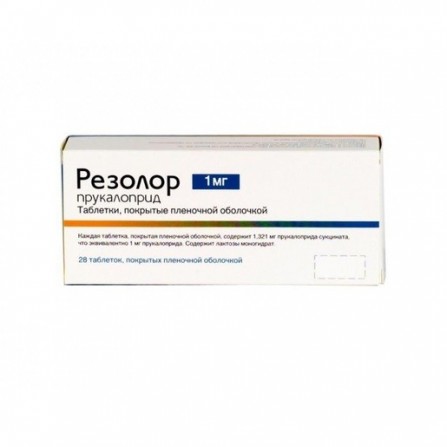Resolor film-coated pills 1 mg N28
Condition: New product
999 Items
Rating:
Be the first to write a review!

More info
Description
Rezolor pills are intended for the symptomatic treatment of chronic constipation in people whose laxatives have not provided sufficient effect in eliminating the symptoms.
Active ingredients
Prucalopride
Release form
Pills
Composition
Prukaloprid 1m, lactose monohydrate, MCC, colloidal silicon dioxide, magnesium stearate.
Indications
For the treatment of chronic constipation.
Dosage and administration
The drug is taken orally, regardless of the meal, at any time of the day. Adults: 2 mg 1 time per day. Elderly (over 65): start with 1 mg 1 time per day, if necessary, increase the dose to 2 mg 1 time per day. Children and adolescents: Resolor is not recommended for use in children and adolescents under 18 years of age. Patients with impaired renal function: in severe impaired renal function (glomerular filtration rate less than 30 ml / min / 1.73 m2), the dose is 1 mg 1 time per day. For patients with mild and moderate renal impairment, dose adjustment is not required. Patients with impaired liver function: in severe impaired liver function (Child-Pugh class C), the dose is 1 mg 1 time per day. Due to the specific mechanism of action of prucaloprid (stimulation of intestinal motility), an increase in the daily dose of more than 2 mg is unlikely to increase the effect. If taking prukaloprid 1 time per day for 4 weeks does not give effect, you should re-examine the patient and determine the feasibility of continuing treatment.
Side effects
From the side of the central nervous system Very often: headache, Often: dizziness, Infrequently: tremor. Since the cardiovascular system Infrequently: heartbeat. On the part of the gastrointestinal tract. Very often: nausea, diarrhea, abdominal pain, Often: vomiting, dyspepsia, rectal bleeding, flatulence, abnormal intestinal noise. Infrequently: anorexia. From the genitourinary system Often: pollakiuria. General Frequently: weakness, Infrequently: fever, feeling unwell. The most frequent undesirable reactions when using Rezolor were headache and adverse reactions from the gastrointestinal tract (abdominal pain, nausea, diarrhea), each of which was observed in about 20% the sick. Adverse reactions developed predominantly at the beginning of treatment and usually disappeared after a few days, without requiring cancellation of treatment. Other adverse reactions were observed sporadically. Most adverse reactions were mild or moderate.
Interaction with other drugs
In vitro data indicate a weak ability of prucaloprid to interact, and at therapeutic concentrations it is unlikely to affect the metabolism of simultaneously used drugs by enzymes of the cytochrome system. Although prucalopride may poorly bind to P-glycoprotein (P-GP), it does not inhibit activity (P-GP) in clinically significant concentrations. A potent inhibitor of CYP3A4 and P-glycoprotein ketoconazole at a dose of 200 mg 2 times a day increased the AUC (area under the concentration-time curve) of prucalopride by about 40%. This effect is too small to be clinically significant, and is most likely associated with the suppression of the active transport of prukaloprid in the kidneys by P-glycoprotein. The same interaction as with ketoconazole can be observed with other active inhibitors of β-glycoprotein, for example, verapamil, cyclosporin A and quinidine. Prucalopride is also likely transported by kidney and other vectors.
special instructions
Contraindications: - hypersensitivity to the active ingredient or any excipient, - renal failure, requiring dialysis, - perforation or bowel obstruction due to anatomical or functional disorders of the intestinal wall, mechanical intestinal obstruction, severe inflammation of the intestine, for example, Crohn's disease, ulcerative colitis and toxic megacolon / megarectum, congenital lactase deficiency, lactose intolerance, glucose-galactose malabsorption.


